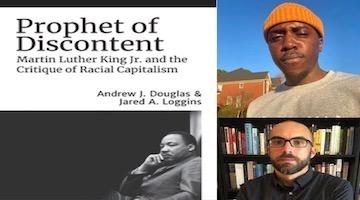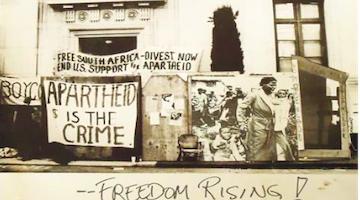Glaude has done a great injustice to Baldwin, turning the great Black writer and thinker into a mere liberal burned out by trauma and a sense of his fragility.
“Baldwin imagined a new world and wide possibilities for struggle; Glaude imagines nothing.”
Eddie Glaude’s new book Begin Again: James Baldwin’s America and Its Urgent Lessons for Our Time is not worthy of Baldwin, nor adequate as an ideological or theoretical interrogation of the current epoch of crisis. This moment of uncertainty, political and social ambiguity, paradox and intensifying class, racial and social contradictions are so severe they could occasion societal collapse. Inherent to this moment, as well, is the potentiality of radical societal transformation. Such a moment cries out for the singularity of James Baldwin’s thinking on matters of social crisis and struggle. However, Glaude seems committed to the obsolete and unnecessary philosophies and worldviews shaped by liberal reformism and capitalist democracy. What else can we conclude since the class conflict, the impoverishment of the proletariat, the unbelievable concentration of wealth, the precariousness of Black and Brown life, are not mentioned.
Rather than seeing Baldwin oeuvre’s connection to this moment of crisis, Glaude reduces Baldwin to a “fragile queer man” and his most important essays, especially those contained in the book No Name in the Street, as responses to Baldwin’s trauma.
The sentimentality of Glaude’s narrative should not obscure its interior logic nor its political and ideological commitments. While claiming to explain Baldwin’s fragility and despair, it’s actually about Glaude’s despair. Rather than examine the radical potentialities of this moment, he writes from ideological and philosophical standpoints that are vastly different from Baldwin’s; in important ways their opposite. Ideologically Glaude assures bourgeois liberal reformists that they still have time to return to bourgeois normality in a post Trump, post COVID 19 world. In important ways it is a book of this Time, however, it is not a book for this Time.
“Glaude reduces Baldwin to a “fragile queer man.’”
Baldwin was singularly situated to examine the historical/political moment after the assassinations of Malcolm X and Martin Luther King Jr. No Name in the Street examines the state of the Black Freedom Movement, the possibilities of a new generation of leaders and attempts to answer the strategically important question, Where Do We Go From Here: Chaos or Community”(Martin Luther King), “What Is To Be Done” (V.I. Lenin) and “Whither Now and Why”(W.E.B Du Bois).
It’s written at the moment of a new stage of the Black Freedom Movement, of the anti-war movement, a Black revolutionary rank and file movement in industrial plants, growing movements against poverty and for the rights of women. Baldwin takes the measure of the ongoing devastation brought on by the white supremacist social system. He argues the nation had reached a moment of truth. This truth was being advanced by a new generation of revolutionaries like Angela Davis, Huey Newton and Stokely Carmichael. They represented “a viral impulse long since fled from the American way of life.” The essays are Baldwin examining how from the ruins of the racist and imperialist system the forces of revolutionary change could upend the old system heralding a new moment for democracy and socialism.
“Baldwin argues that the nation had reached a moment of truth advanced by a new generation of revolutionaries.”
Glaude’s book reduces these essays to weak and fragile responses to the historic crises of that time and indeed of ours. The crisis of the soul (of the interior life) is given primacy over the crises of the white supremacist and capitalist social system; indeed, of humanity itself. It lacks the courage and boldness of Baldwin’s essays. But Baldwin and Glaude not only speak from different ideological positionalities, they speak for different social and class/race forces in society. Put simply, the US ruling class is less and less able to rule. They are viewed as increasingly illegitimate and historically unnecessary by the majority of US people. Glaude’s narrative expresses the hope that they seize the time and save the existing system, albeit in a reformed character. Whereas Baldwin insisted that out of the crisis of his time, and certainly of ours, the revolutionary transformation of society was possible; Glaude pessimistically insists that out of this crisis merely a return to something that replicates the Obama time is possible. Baldwin imagined a new world and wide possibilities for struggle; Glaude imagines nothing.
In our Time/History/Moment the axis of human civilization is shifting from the Time/History/Moment of Europe, to a post-European /post-capitalist global civilization. Such a prospect is terrifying for liberal reformists and those invested in existing arrangements of class and race hierarchies. The “liberal imagination” to which Glaude is anchored, is not imagination at all, it is looking backward because the future world is too frightening. Baldwin, looking to the present as a way to figure out the future, challenged the lie of whiteness and its worship of wealth and celebrity and other social/cultural pathologies. He assured the ruling elite their time had run out. The Baldwinian imagination was rooted in future possibilities tied to struggle.
“The US ruling class is less and less able to rule and are viewed as increasingly illegitimate and historically unnecessary.”
Writing can be viewed as a process of choices made by an author. They are, to use the language of political struggle, strategic and tactical choices. The ultimate product can be read as the outcome of these choices. In the case of an historical figure and consequential writer such as Baldwin these are decisive to how such a figure is viewed. Glaude has chosen to situate Baldwin as a figure “for our time” who speaks for and in the language of the elite. Glaude’s choice separates Baldwin from the Black proletariat, his working-class experiences and his Black proletariat consciousness. This is huge. In so doing, Baldwin’s “urgent lessons for our time,” are not lessons for the poor and suffering, who make up the majority of Black folk and about half of the nation’s population. Thus, when Glaude makes Baldwin a figure who is defined by trauma, grief and a sense of white betrayal, he chooses an emphasis, which separates Baldwin’s writing from the crises of the class and racial order and those who benefit from it. Logically Glaude’s emphasis upon trauma as the organizing principle of Baldwin’s life leads to seeing Baldwin as concerned with victimization and not resistance. He says, for instance, “The book [No Name in the Street] reads like the reflections of someone who has been traumatized, folding back on itself and twisting time as past and present collide and collapse into each other.” No Name in the Street is a critical discourse about where the Black Freedom Movement would go after the ruling elite had engineered the attempted decapitation of it with the assassinations of many of its leaders. Baldwin saw a new urgency manifested in young leaders. In it, like so much that came before it, and was to follow, Baldwin speaks and thinks as a freedom fighter. He knew that the struggle would be protracted and there would be losses.
“Glaude’s choice separates Baldwin from the Black proletariat, his working-class experiences and his Black proletariat consciousness.”
If not through trauma, how did Baldwin see and therefore know. Baldwin called seeing witnessing. From many accounts, including Baldwin’s, this he got from perhaps the most important figure in his life, the painter Beauford Delaney, called by Baldwin his spiritual father. Baldwin recounts how on one occasion when he and Delaney were walking in Greenwich Village, they passed a puddle with oil drifting on the top. Delaney reportedly asked Baldwin what he saw. Baldwin at first saw nothing remarkable. Delaney insisted look again. When he looked again Baldwin saw a film of oil in the water, how it distorted and made remarkable the buildings reflected in the water. Baldwin in later years said that this had to do with complex vision. Beuaford’s lesson was that “what one cannot or will not see says something about you” (see David Leeming, Amazing Grace, A. Life of Beauford Delaney, p69). Baldwin extrapolated this practice of looking again, and again and many times to see and to witness phenomena in their complexities and understand their deepest meaning. Throughout his writing Baldwin uses Harlem, the American South and the racial landscape of America as instances of looking multiple times to witness, to understand. This Baldwin/Delaney phenomenology is not unconnected to how Baldwin saw the world and acted in it. Baldwin’s ways of seeing race, whiteness, social class and finally revolutionary change is connected to this phenomenology. Again, Glaude fails to grasp how this Baldwinian phenomenology of complexity (often associated with artistic vision) establishes a revolutionary practice of knowing and being in the world.
Glaude is right, these times necessitate a return to Baldwin. In doing this we must be true to who Baldwin was and what his oeuvre is. To turn Baldwin into a mere liberal burned out by trauma and a sense of his fragility is a distortion. The Baldwin we need and is abundantly present in all of his work is the revolutionary Baldwin. We must learn the lesson Delaney taught the young Baldwin; we must learn to look, to see and to understand the complexities of our Time and to transform that understanding into purposeful societal action to bring about change.
Anthony Monteiro is an organizer with Philadelphia’s Saturday Free School, a Du Bois scholar, a community educator, a radical and activist.
COMMENTS?
Please join the conversation on Black Agenda Report's Facebook page at http://facebook.com/blackagendareport
Or, you can comment by emailing us at comments@blackagendareport.com



















